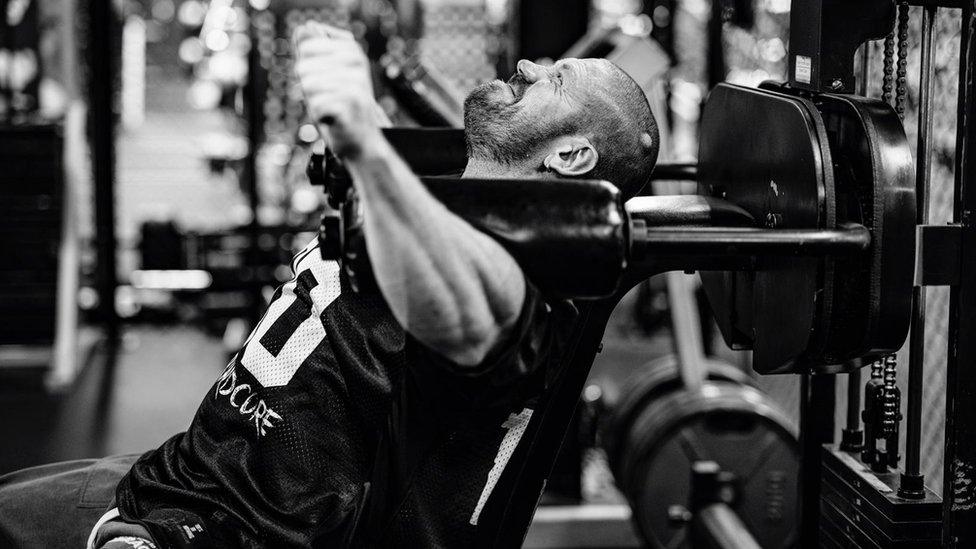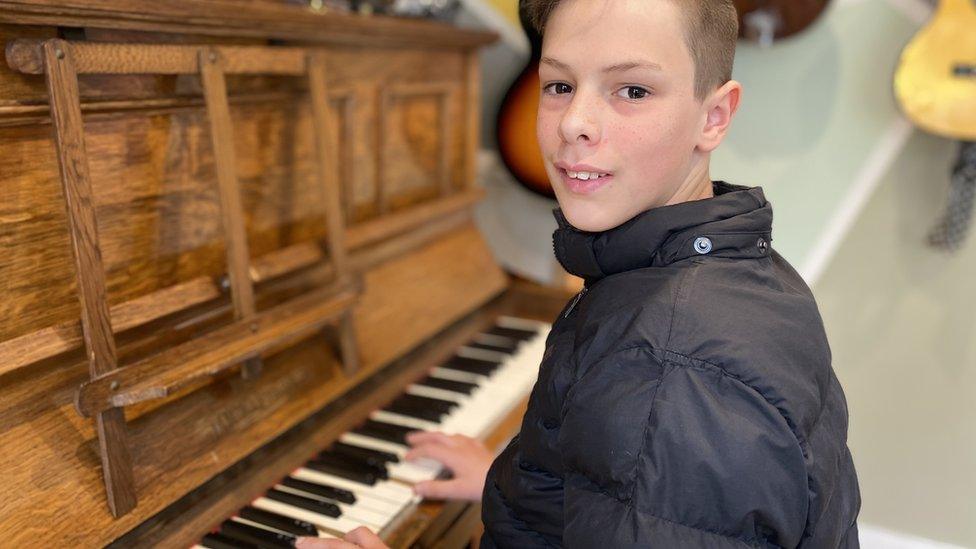Bristol man on verge of prison channels anger into fitness
- Published

Daniel McNab almost was on the verge of going to prison
When Daniel McNab was narrowly spared jail after being convicted of affray, he knew it was time for something to change.
As a youth, his teachers dubbed him a "dangerous child" with "no intellect" and anger issues.
But at 21, he managed to turn his life around when he was introduced to a weight bench, which became a vital tool to restoring his inner balance.
"I was a naughty kid, I'll take that," joked the 39-year-old from Ashton, Bristol.
Despite dropping out of school at 14, Mr McNab has since achieved two bachelors and a masters degree.

Daniel McNab pictured as a teenager
He was diagnosed with ADHD at the age of 12 and in spite of having a strong support system at home, he said he felt angry all the time and that was all that anyone ever spoke to him about.
"I was called terrible things, disturbed, stupid and all sorts," he said.
"I wanted to behave in class but I was incredibly reactive to my emotions.
"I didn't fit into the mainstream schooling system and it was interpreted that I had no intellect and that I was looking for trouble.
"There wasn't enough room for me to explore my skills as I didn't fit the mould."

Mr McNab found strength through weightlifting when he was gifted a weight bench
Mr McNab said he was bounced from school and ended up in a pupil referral unit where he failed his exams.
In an emotional interview with BBC Radio Bristol, he said: "I was angry and it wouldn't take much to trip me up and ultimately, I ended up fighting a lot."
His narrow brush with jail came after his affray conviction in 2004 for getting into a big fight.
The case was sent to the crown court, but the judge spared him jail as he was employed and had re-enrolled at college.
"I walked out of the courtroom and I said: 'you'll never see me again'."
"And I haven't been in trouble since."
He said the judge "threw everything" at him, but instead he was ordered to do community service and was tagged under house arrest.
"My life had no structure, it had no purpose, I was going nowhere.
"My mum was distraught and I felt bad about that."
The one day, his friend Felix Cembrowicz, gifted him a weight bench.

He was gifted a friend by his friend Felix, who later passed away when he took his life
"I used to ridicule people that went to the gym - maybe it was jealousy that they had a purpose and I didn't.
"Sadly, my mate who gave me the bench suffered from mental health and it couldn't save him and he took his life," said Mr McNab.
In the six months Mr McNab spent under house arrest, weightlifting became a tool for channelling his energy - one thing in his day that stayed consistent rather than him hoping that "everything would evaporate".
"I felt the release of the things that I was looking for in the negative ways and I was able to release that in a positive way without having any need for regret."

Mr McNab said weight training saved his life and gave him purpose
Mr McNab said bodybuilding taught him consistency and structure - skills which he later applied to his education and career.
"The tools that I learnt about structuring and foresight and not being reactive allowed me to go to London College of Music," he said.
'Safe place'
"I still feel like I struggle. I still feel like I have the same battles that I had when I was young but my coping mechanisms [are] tight."
He describes the gym as his "safe place".
After a 10-year career teaching music technology, he went on to pursue professional bodybuilding, which he does alongside his work as a personal trainer and coach.
"The gym is the time when the phone's not on and I am uncontactable.
"It's a time of meditation. It's not about going and getting the perfect body. It's about being in the moment."
If you've been affected by the issues in this story, help and support is available via the BBC Action Line.

Follow BBC West on Facebook, external, Twitter, external and Instagram, external. Send your story ideas to: bristol@bbc.co.uk , external
- Published5 November 2023

- Published3 November 2023

- Published22 May 2023

- Published26 July 2023
